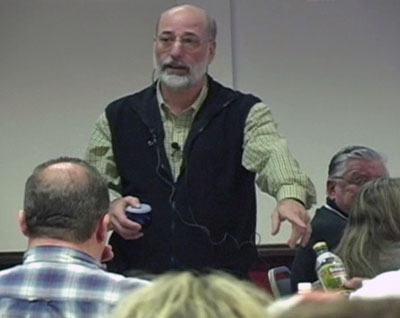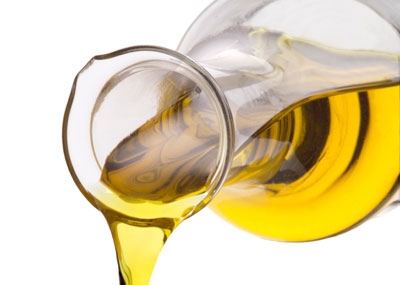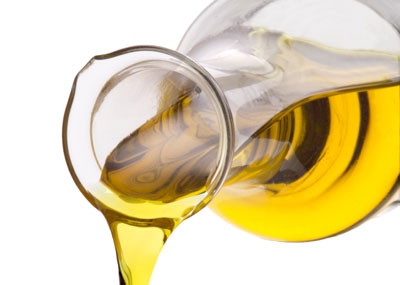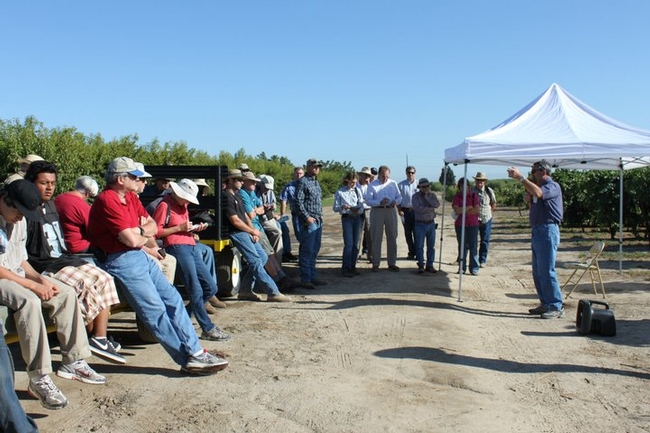
Posts Tagged: Paul Vossen
Dryland farming yields small amounts of very flavorful produce

Bland spoke to a number of experts who believe withholding irrigation produces a superior product.
"Once you taste a dry-farmed tomato, you'll never want anything else," said Jen Lynne of Happy Boy Farms.
"Dense and really flavorful" locally grown dry-farmed potatoes are available at Whole Foods Market in Sebastopol, said produce buyer Allan Timpe.
Paul Vossen, University of California Cooperative Extension adviser in Sonoma County, says many people who dry farm do so only because they have no water with which to irrigate their land.
"They do it because they have to, and so they'll make it part of their marketing strategy," he says.
Florida citrus growers explore olive opportunities

Reporter Ryan Raiche covered a meeting at the University of Florida Citrus Research and Extension Center where UC Cooperative Extension farm advisor Paul Vossen introduced growers to olive production and marketing and offered citrus growers the opportunity to taste a variety of olives and olive oils.
“This is not a slam dunk, because this is a really peculiar crop that needs really specific things in order to flower and fruit,” Vossen said.
Olives thrive in a dry climate where it’s not too hot and not too cold. Vossen said rain during bloom season could wipe out the crop.
Ojai man appointed to Regional Water Quality Control Board
Ventura County Star
Gov. Jerry Brown has appointed Ventura County UC Cooperative Extension director emeritus Larry Yee to the Los Angeles Regional Water Quality Control Board.
The board oversees water quality issues and has the power to fine polluters.
Yee worked for the UC Cooperative Extension from 1975 to 2008 and was the Ventura County director from 1986 to 2008. He also was director of the UC Hansen Trust, which was set up to promote agricultural research and education.
LA area olive farm produces oil for local markets

The story focused on Joyce Lukon, who bought a lot with a view of Topanga Canyon as an investment and tried to make it more attractive for resale by planting grapes and olives. She took classes in the sensory analysis of olive oil taught at UC Davis by Paul Vossen, a Sonoma County farm advisor who has been a prime inspiration of the California artisanal olive oil boom, and he later visited several times to advise her.
Lukon now sells her 375-milliliter bottles of olive oil for $25 each at two farmers markets and online.
Debate over groundwater heats up
Tim Hearden, Capital Press
What to do about declining groundwater supplies was the subject tackled by 100 farmers, environmentalists and government officials during an all-day workshop offered by the University of California Cooperative Extension.
"We need to pay attention, we need to be educated and we need folks to talk to their local leaders and help them understand ... both sides of the issue," said Tehama County supervisor Bob Williams, who is an oat and alfalfa hay producer.
Midyear cuts will spare ag programs
Tim Hearden, Capital Press
The $1 billion in midyear state budget cuts announced by Gov. Jerry Brown won't directly affect agencies that assist farmers and ranchers.
The University of California system will use reserves to absorb its sudden $100 million hit, meaning local Cooperative Extension offices will be able to maintain their services, said Dianne Klein, a media specialist on the UC Office of the President communications staff.
"What the university intends to do, on a short-term basis, is draw upon reserves currently held to pay for unexpected cost in employee health and welfare plans," Klein said in an e-mail. "This, in essence, is a rainy day fund. We've declared a rainy day."
There may be other measures to cover the $100 million loss, but using the health plan fund "represents the lion's share of the cost," she said.
California olive oil trade rivals Europe

In fact, the article noted, a recent study by the Olive Center at UC Davis found that 69 percent of imported extra-virgin olive oils bought off the shelves of California supermarkets failed to meet international standards. European producers, however, said that testing supermarket products proves nothing about the relative quality of imported and domestic oils.
“You can’t decide that all imported oils are suspect and dismiss thousands of years of craftsmanship,” scoffed an American expert who farms olives in Tuscany. Critics also question the cultivation and production methods used in California.
UC Cooperative Extension olive oil expert Paul Vossen, who has worked with virtually every olive grower in the state, called that idea “a bunch of baloney.” He said high-density planting currently works only with certain varieties — arbequina and arbosana from Spain, and koroneiki from Greece — but for those, the practice is no different from other kinds of farming.
Early rain complicates walnut harvest
Tim Hearden, Capital Press
Nearly a week's worth of early-season rain in Northern California brought the normally robust harvest of middle and late walnut varieties to a stop. More than half the state's estimated 485,000-ton walnut crop consists of later varieties, many of which got caught in the rain
With growers fearing they might be hit with unfavorable weather during their harvest, some applied etheryl to induce hull split early, said UC Cooperative Extension farm advisor Rick Buchner. Whether or not that was beneficial is "a matter of some debate."
"Some guys were happy to get the husk open because the nut is going to dry faster," he said. "Even if it's laying on the ground, it's drying. That could be an advantage."
Kearney trial could reveal the next great white wine

Proposed Green Tech High School Academy draws critics
Jennifer Bonnett, Lodi News Sentinel
Lodi Unified School District has proposed developing a Green Tech High School Academy, the first of its kind in California. The district has already spent hundreds of hours and thousands of dollars laying the groundwork for a new school that some trustees say they can’t support. Parent Paul Verdegaal called it the wrong idea at the wrong time. “It appears that LUSD is once again chasing pipe dreams at great cost in money and opportunities for students to actually learn, especially with reduced budgets," he said. The article noted that Verdegaal is a farm adviser for the University of California Cooperative Extension in San Joaquin County. Verdegaal said he sees students who don’t understand science or math, key subjects in creating sustainable practices.
This year's olive harvest is the pits
Martin Espinoza, The Press Democrat
Sonoma County olive growers are bracing for a disastrous harvest, one that could wipe out the supply of fresh local olive oil. Paul Vossen, a farm advisor with the University of California Cooperative Extension, said that in an average low-yield year olive orchards produce 50 to 60 percent less. “We have some places where they have almost nothing,” he said.